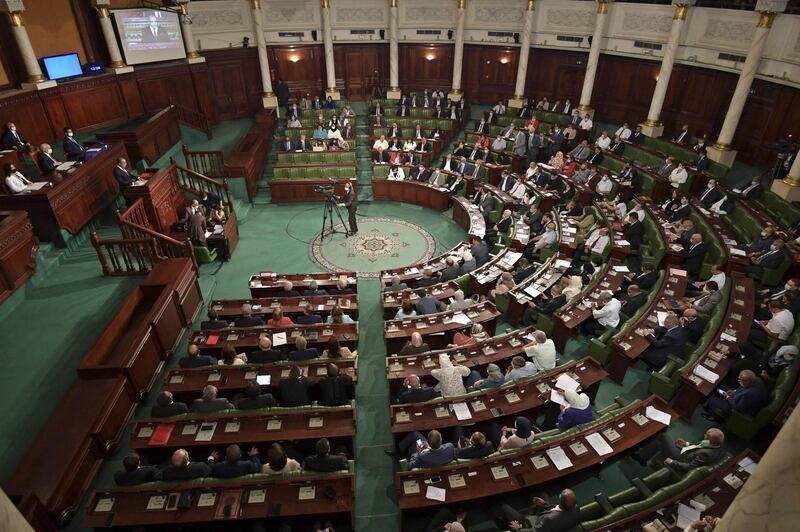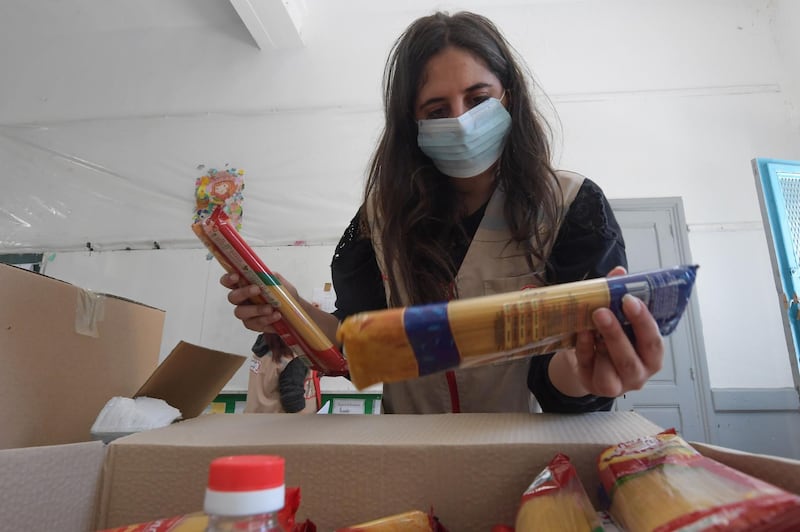The Tunisian parliament voted confidence in the technocratic government proposed by Prime Minister Hichem Mechichi in the early hours of Wednesday.
The new government, which required 109 of the 217-member body to vote in favour, eventually passed with 134 votes.
This is the third government to oversee Tunisia since the legislative elections in October last year, continuing a legacy of political turmoil that has dogged the country through its recent history.
Opening the plenary session on Tuesday morning, Mr Mechichi told parliament that he intended to halt the “bleeding” of public finances, by relaunching oil and phosphate production in Tunisia’s south, both subject to regular interruptions by protests over employment. He also outlined plans to overhaul the country’s bureaucracy, maintaining the state’s spending power in order to protect the country’s most vulnerable.
Following the resignation of former Prime Minister Elias Fakhfakh in July after corruption allegations, Tunisian President Kais Saied – a political independent – stepped in to designate his own adviser and Interior Minister Hichem Mechichi to fill the void in an apparent bid to break with the country's party system.
Tasked with forming a technocratic government outside of the parties, Mr Mechichi’s efforts have proven controversial. Faced with opposition from the Democratic Current, which holds 38 seats and, initially, the self-styled Muslim Democrats, Ennahda, who hold a plurality within parliament and claimed the proposals ran counter to the nature of parliamentary democracy.
However, following an eleventh hour and heavily caseated U-Turn by Ennahda during the early hours of Monday morning, as well the support of the second largest party, Qalb Tounes, the vote’s passage was largely assured.
The task ahead of the government is significant. The threat posed by the global coronavirus pandemic, which appeared to be abating following an early lockdown is again on the rise, though numbers remain comparatively small in global terms.
However, its economic impact may yet prove a greater hurdle. In June, as the loss in general trade, as well as the absence of the year’s vital tourism revenue became apparent, the country’s investment minister forecast the economy could contract by as much as 7 per cent, the steepest drop since the country won independence from France in 1956.
Unemployment, which averages around 18 per cent nationwide, reaches as high as 30 per cent in parts of Tunisia’s marginalised interior. By the end of this year, according to a joint study carried out by the Tunisian government and the United Nations, that figure is expected to increase to 21.1 per cent.
Youth unemployment is especially high, with the World Bank citing joblessness between 15 and 24 year olds running to 36 per cent last year.
"PM Mechichi has a Herculean task ahead of him," Sharan Grewal, a visiting fellow at the Brookings Institution in the US, told The National. "He has to rescue Tunisia from what is expected to be its worst economic crisis, address a re-emergence in coronavirus cases, and restore confidence in a government whose last occupant was brought down on corruption allegations.
“In theory, having a technocratic government should help: it will not be internally divided along partisan lines like the previous government, and should be more willing to take the risks the country needs without fear of punishment at the polls.”
However, divisions caused by the sidelining of Tunisia’s parties may come at a cost, Dr Grewal explained.
“PM Mechichi is also caught between the escalating institutional rivalry between the president and the parliament, a rivalry that nearly derailed his confidence vote already. Without a constitutional court, (which has yet to be established) to adjudicate the powers of each institution, much will depend on Mechichi and his personality. A smooth and successful tenure will require Mechichi to satisfy all sides,” Dr Grewal concluded.
Exacerbating the newly installed Prime Minister’s difficulties will be negotiations with Tunisia's key donors who are seeking reform in return for continued aid. Outside of an emergency loan of $743 million granted to the country by the International Monetary Fund, (IMF) to help counter the pandemic in April, are the series of loans worth $2.8 billion agreed with the body in 2016. Negotiations over a further payment were suspended in July following the resignation of Mr Fakhfakh.
Many of the reforms mandated by the IMF to secure that payment, such as liberalising Tunisia’s sclerotic economy, will likely encounter political resistance, both in parliament and in the street. Last year, reacting to many of the conditions laid out by the IMF, the country’s powerful general trade union, the UGTT led a general strike that all but paralysed the North African country.















